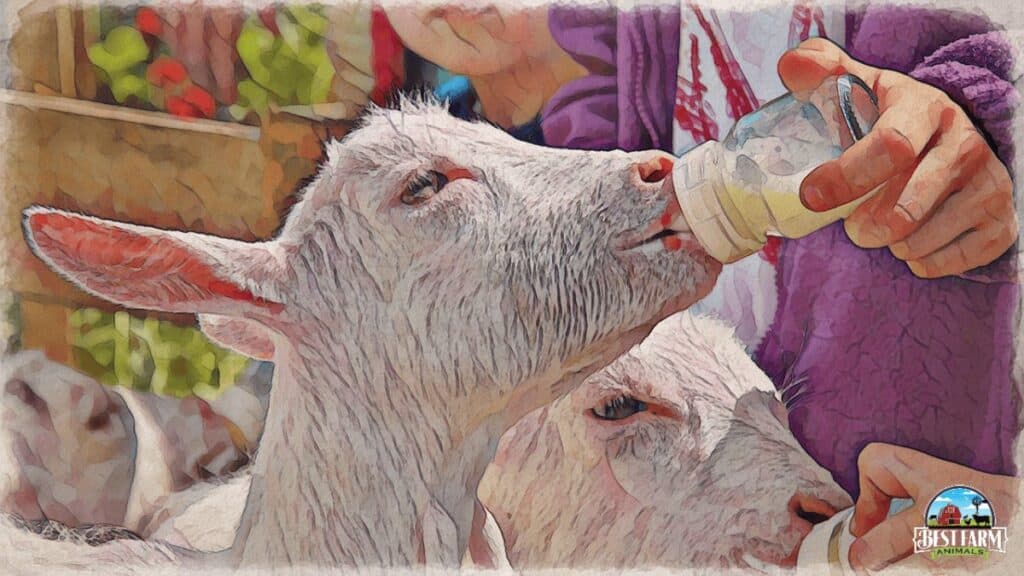Recently, our goat gave birth to two little, beautiful baby goats. If you have baby goats, you are probably worried about when to wean, what supplements babies need, and when to introduce hay.
When can baby goats start eating grass? While baby goats will start nibbling grass hay almost from birth by mimicking mom, they won’t get many nutrients from hay until they are 4 weeks old, or about double their birth weight. By 8 weeks, goat kids eat a substantial portion of their diet in grass hay.
Baby goat kids will start to eat hay as a minor part of their diet within days of birth. Kids can be weaned as young as 30 days old, but waiting until they are 6-8 weeks old will help develop and grow your baby goats. During this time, kids will start to munch on hay naturally.
Timing isn’t a steadfast rule, though. When a goat reaches 2.5% of its birth weight, it can be weaned and have hay become its main diet. Their bodies are ready to digest hay. Kids their moms don’t nurse will need to be bottle-fed for at least 6-8 weeks before transitioning to hay.
Weaning is the process of introducing your baby goats to solid food. You may be surprised to know that hay is the preferred feed of goats. Hay should make up 80-100% of a goat’s diet. And, there are many kinds of hay. (link to article) Its fibrous material is beneficial to build rumen in baby goats. The rumen is baby goats’ main digesting chamber that develops during the weaning period.
You should avoid any quick transitions in your baby goat feed from milk to hay. It can cause bloating and other severe digestive issues due to improper rumen development. At birth, 15%, or less, of a baby goat’s diet should be hay.
Hay is the preferred food for goats. It is essential. Hay provides both nutrition and roughage or fiber, that assists kid goats in rumen development.
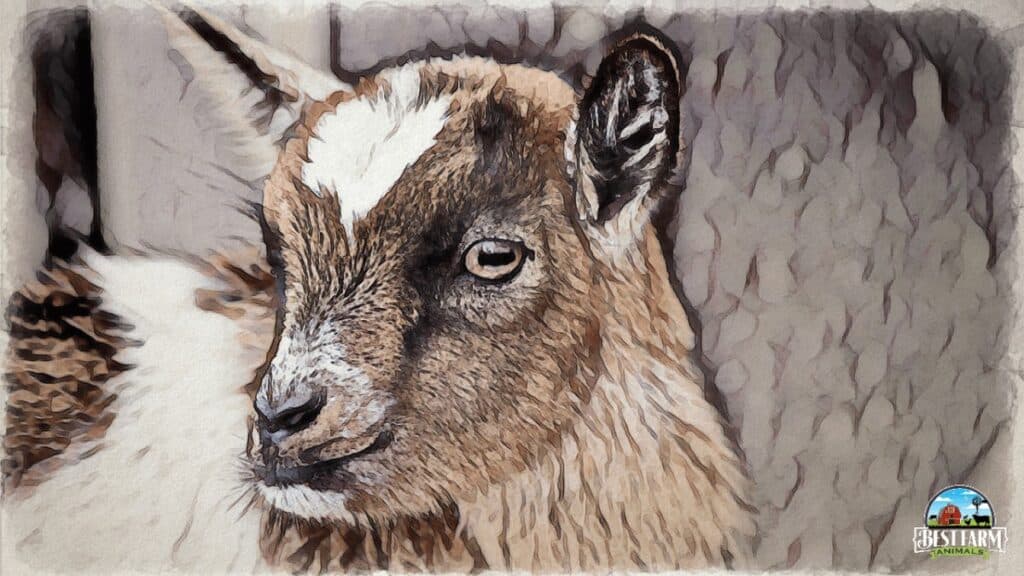
Best Hay for Baby Goats: What Hay Do Goat Kids Like To Eat
Grass hay is the preferred type of hay to feed baby goats. However, because kid goats are growing and their bones developing, alfalfa is also acceptable for young goats. Alfalfa has higher protein and calcium than grass hay.
Most grass hay contains around 7-8% protein content. Regarding grass hay, Bermudagrass and orchardgrass are excellent options for a goat kid. These grass hays are more palatable and nutritious.
Baby goats can also eat Timothy grass hay as it’s Timothy grass is rich in essential vitamins, nutrients, and fiber, making it an excellent food for baby goats. Fiber is good for healthy digestion and digestive system.
Timothy grass hay is low in sugar, which is good for baby goats because too much sugar can bloat them (such as alfalfa hay).
When feeding grass hay to your baby goats, ensure it is of the highest quality and is free from mold and dust. Do not feed grass hay to pregnant goats as it won’t give them enough energy to grow healthy kids and maintain a good weight.
The amount of grass hay to feed your goats depends on their weights and ages. For example, a 10 lb goat should eat about 0.2. lbs of hay per day.
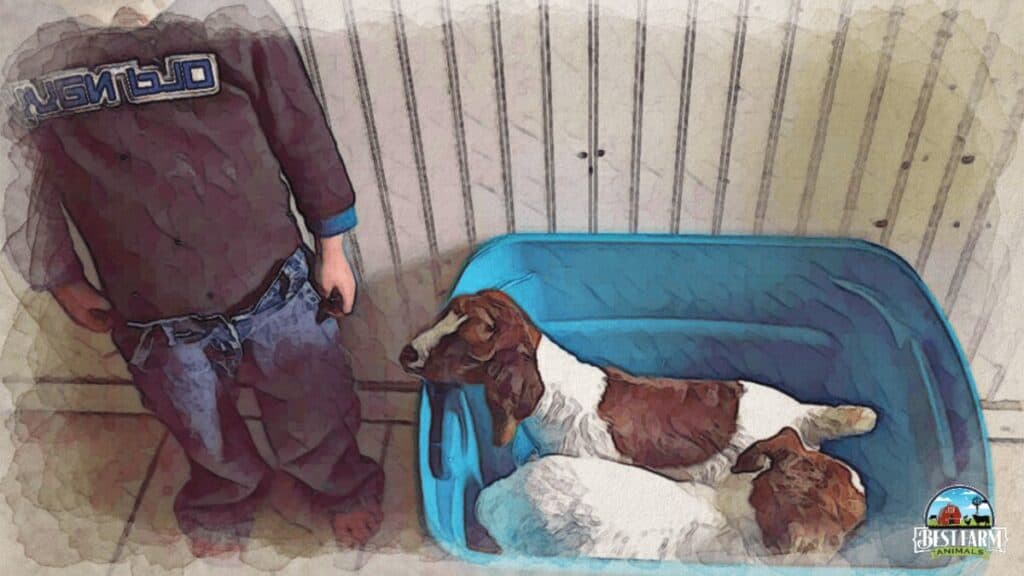
Note that both alfalfa and grass hay should come from the first and second cuttings. The later the plant has to grow, the less nutritious it will be for your goats. As plant flowers, the nutrients go into the seed, and it becomes nutrient deficient in the stalk, leaves, and other parts.
One of the most critical things is hay quality as kid goats are under development. Don’t feed your goats contaminated or moldy hay. It will disturb and harm their digestive system. Consider finding quality hay a priority.
Important tip: Goats have sensitive digestive systems and can easily bloat. Offer free-choice baking soda to your goats to help with their health and avoid bloating and the other health issues that can come.
What Kind of Hay is Best for Kid Goats?
- Alfalfa
- Timothy hay
- Meadow grass
- Fescue
- Brome
- Orchard grass
- Blue grass
- Oat hay
- Bermuda grass
- Annual ryegrass
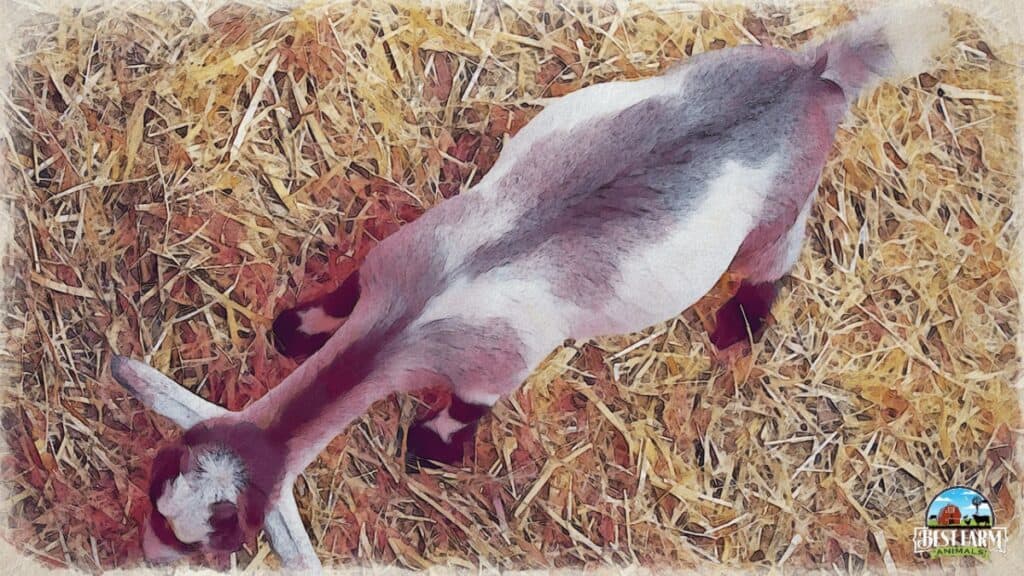
When can Baby Goats Digest the Nutrients in Hay?
Baby goats can start eating hay at two weeks old. Some kid goats can take up to two months to digest hay and properly absorb the feed’s nutrients. Doelings that are kept with the mamas for a longer period may occasionally nurse but will increase their hay until they mostly eat hay.
Bucklings should be weaned and separated from their moms by 8-10 weeks because of their budding sexual maturity and ability to mate their mamma and sisters.
At this age, baby goats mainly digest fiber from hay which improves the development of the epithelial lining of their rumen. This will ultimately increase the absorption of their nutrient capacity. Furthermore, you can also provide baby goats with some minerals for their muscle growth. But keep in mind that you can only give them loose minerals to facilitate digestion.
How to Facilitate Baby Goat for Hay Feeding
Baby goats will usually have access to taste and nibble on hay when they are with their mamas. If you have a baby goat that’s separated from its mom, you can still offer hay when your goat is only two weeks old. But don’t expect your kid goat to start eating hay in earnest for at least a few more weeks.
During weaning, separate baby goats from their mother. Offer hay as an open choice food. If you are bottle-feeding your baby goats, you can gradually reduce their bottle feedings by a couple of hours and reduce the number of times they nurse from the bottle each day. During this period, make sure your goats have plenty of hay to eat.
A baby goat likes to try new food and will start nibbling consistently. This will automatically drive baby goat attention toward hay without extra effort.
I’ve noticed our baby goats eating grass hay as early as 2-3 days old. They don’t usually swallow it, but will start mimicking their mamma by nibbling and tasting it. While we raise the Boer goats with their mamas, the milk goats are bottle-fed and take much longer before they start nibbling at grass. In either case, a comfortable environment helps baby goats to adopt solid food quickly.
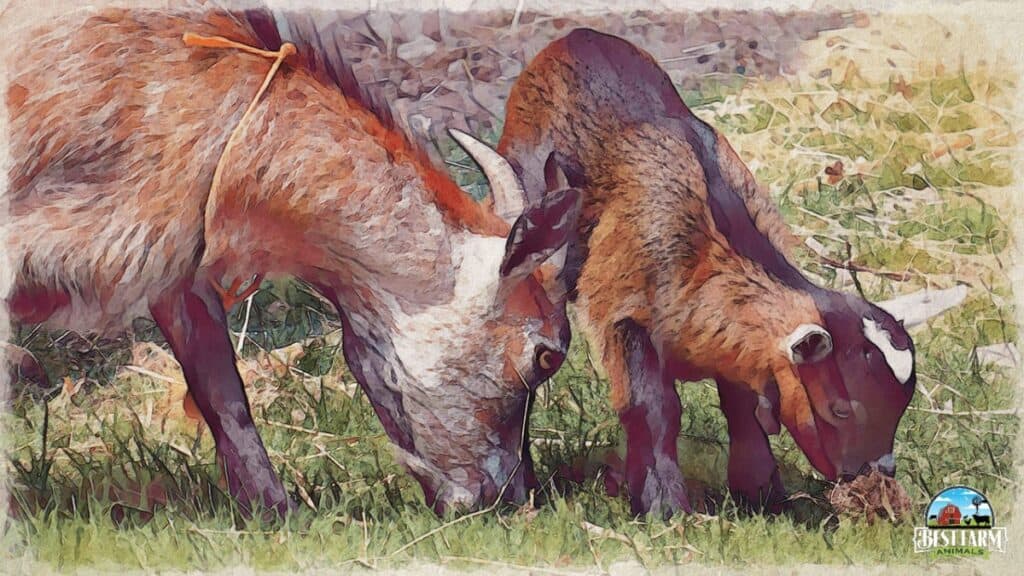
Preparing Baby Goats for Hay Feeding:
- Ensure newly kidded goats are given at least 8 oz of colostrum within 24 hours of birth. This will help their digestive systems.
- Offer free-choice hay within days of birth
- Offer free-choice water
- When baby goats are raised with their moms, they usually eat hay sooner than bottle-fed baby goats.
- At 4 weeks, if your goats aren’t munching from hay occasionally and aren’t around grown goats, mimic eating hay to show them how to eat it.
- Provide fresh hay about 20 minutes before it’s time to bottle feed baby goats so they have quality food to investigate when they are getting hungry.
- If weaning from the mama’s start separating goat kids for 2-3 hours at a time and offer hay during that time.
- Monitor milk consumption at 8 weeks for overeating disease
What to Feed a Separated Baby Goat?
If you end up with an orphaned baby goat, make sure you feed it colostrum in the first 24 hours. After that, you’ll need to feed it milk. Goats’ milk is ideal, but you can also feed cows’ milk to baby goats. If you feed cows milk from the store, I recommend pasteurizing it again by heating it in the microwave until it’s hot. After it cools, it’s safe to feed to the baby goats.
Additionally, you can purchase a milk supplement that’s a commercial goat milk formula specifically for baby goats. I’ve used all three types of milk. (You can also purchase a goat colostrum for babies).
Feeding an orphan or separated baby goat is important when you have no alternative milk doe. But, you can feed baby goats by the bottle. You should provide milk by the bottle at least 6-8 times a day for 3-4 weeks, depending upon the health condition of a baby goat.
Usually, you can use milk from other milk doe or milk goat starter formula (check out our favorite kind on our recommendations page). However, using milk from doe instead of goat formula is better.
Baby goats need colostrum, which is different from milk. Lactating mothers produce colostrum for the first few days of a baby’s life. If you don’t have a goat producing any, you can also purchase commercial colostrum for your babies. This is crucial for orphan baby goats as it builds their initial structural and digestive systems.
After a few weeks, you can offer free-choice grass hay to orphan baby goats. First, provide greens or hay. Pellets are ok, but not as good for goats as plain grass hay, and they are much more costly. Continue bottle-feeding while offering grass hay. After 8 weeks, you can fully replace milk with hay, grain, and other feed supplements.
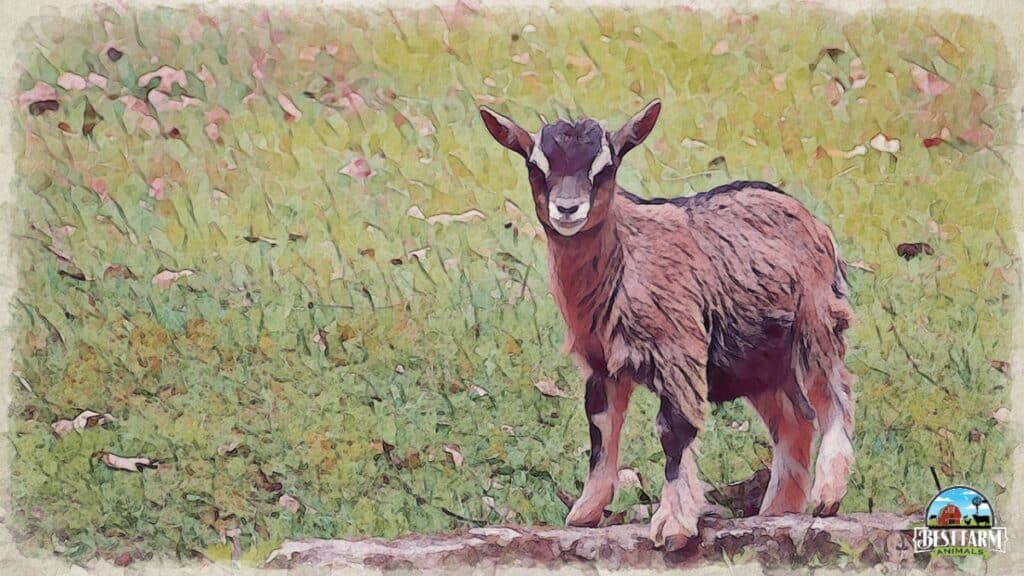
Do Baby Goats Eat at Night?
Goats don’t usually eat at nighttime, but baby goats and kids are different. They cannot go all night without eating, or it will impact their growth and health. Younger baby goats need to feed more frequently, according to their age. During the first week, the baby goat needs six to eight feedings a day, which means a feeding every 3-4 hours.
You should feed your baby goat every 6–8 hours from the second to fourth week. It means that midnight feeding is also included. However, you can feed baby goats just before bed and after you get up. After the fourth week, baby goats no longer need night feedings.
The practical option: When we had baby goats last winter, we got up all night long to feed them every 4 hours. That was murder- especially with human kids waking up early and everything else happening. After talking with Heidi, a friend with decades of experience raising goats, we were able to work out a more doable schedule.
We fed the babies more milk just before bedtime, around 11 pm, and then again at 6 am. We still fed them the full amount per 24 hours, but the daytime feedings were larger since we eliminated the nightly feedings.
It was life-changing. I’m not exaggerating. Sleeping all night for 7 hours kept my sanity and made all the difference. The first night, the babies bleated, but they quickly adjusted their feedings to drink more milk and slept at night.
If you keep a baby goat with its mother for the first few weeks, the baby goat can nurse anytime they want.
Baby Goat Bottle Feeding Schedule
| Age | Frequency of feeding |
| 0-3 days | Colostrum supplement |
| 0-7 days | Every 3-4 hours |
| 1 week- 2 weeks | Every 4-6 hours, increase feedings by 15 minutes a day to adjust. |
| 2-4 weeks | every 6-8 hours |
| 5+ weeks | Every 8 hours from morning to night |
How Long Should A Baby Goat Bottle Feed?
Although baby goats can be weaned as early as 4 weeks, they often benefit from having milk in their diet for up to 8 weeks. If you are nursing a baby goat, you might consider bottle feeding for a little longer than 4 weeks.
A struggling kid can eat as often as 6 times a day or every 4 hours, but they may only eat a couple of ounces at a time. As your kid grows, they will naturally drink more milk and go longer between feedings. A good rule of thumb is that your baby goat will eat about twice as many ounces per day as they weigh in pounds.
At 5-6 pounds, a baby goat eats about 12-15 ounces of milk daily. They should be eating every 6 hours. As your goat gains weight, they will eat 16-17 ounces of milk a day. When your goat weighs at least 7 or 8 pounds, it is ok to reduce the number of bottle feedings each day down to 3 or 4.
Many owners prefer to keep feeding their baby goats 4 times a day, but they may lengthen out the night feedings for convenience’s sake. An 8 lb goat will eat about 18 oz of milk a day but will have smaller feedings during the day and a larger feeding in the morning and right before bed.
When a goat reaches 10 lbs, you can reduce milk feedings two times a day, but the total ounces per day should remain at 20-22 ounces in a 24-hour period. Your goat will eat more ounces until they are about 25 pounds and about 40 ounces of milk daily.
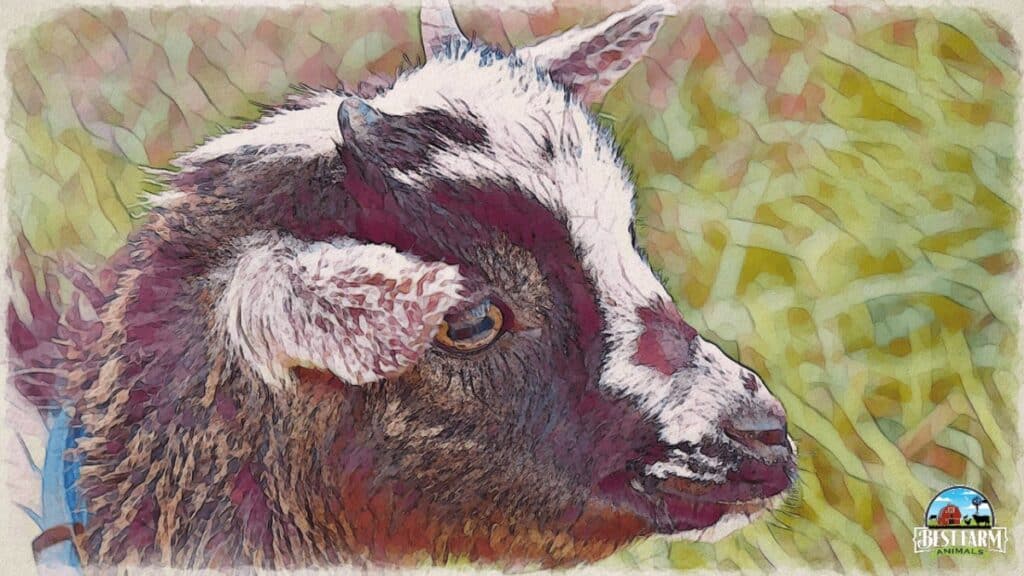
Feeding Baby Goats Grain
Baby goats should not be fed grain as a newborn. Even for adult goats, grain should be treated like candy and used only as a treat. Grain is compacted with calories and can be given to pregnant or lactating does, and to 4H kids who are being fattened for the meat market. Heavy doses of grain are not good for a goat’s long-term health.
After 3-6 weeks, you can introduce grains, as a treat, to your baby goat. At that time, its digestive system is more developed and looks to eat new food. Find grains that are free from mud and stones. Grain is usually sold in four different forms, whole, pelleted, rolled, and texturized.
The best kind of grain for goat kids are rolled grains like rolled oats. Whole grains are whole, they are harder for kids to digest.
Baby Goats That Develop Diarrhea During Weaning
Baby goats that develop diarrhea or scours while weaning may have Enterotoxemia. Enterotoxemia is often a severe disease of goats and can occur at any age. It is caused by two strains of bacteria called Clostridium perfringens (types C and D). These bacteria are ordinarily found in low numbers in the gastrointestinal tract of all goats.
Dietary changes are the primary cause. Be very careful when changing the type of grain or hay that your goats eat. It can stimulate the disease’s growth in the intestines.
During the weaning period, many baby goats develop severe diarrhea. These are the most typical symptoms of this disease. If the mother goat is already a carrier of this disease, the baby goat can suffer severely during the weaning period. The best remedy is vaccinating both mother and baby goat against it.
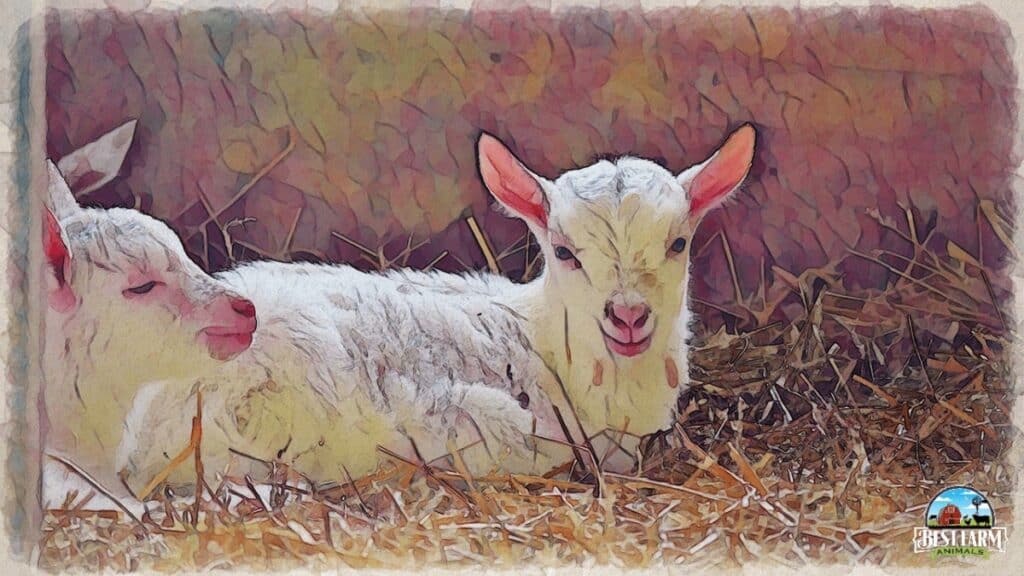
Baby Goats Eat Grass FAQs
Can Baby Goats Eat Straw?
Baby goats can eat straw, which is completely safe for them. Straw provides good roughage. Barley, oat, and wheat straw are popular straws. Goats will munch on straw, but it should not be a large portion of their diet as it’s pretty nutrient deficient.
How Much Does A Baby Goat Eat A Day?
How much a baby goat eats will depend on it’s breed. Newborn Sanaans, a large breed goat, will drink 6-8 ounces every 4 hours. Nigerian Dwarf goats will dring 1-2 ounces 4-5 times daily. If you choose not to feed your baby goats at night, they will drink more milk during the day.
At 30 to 90 days, goats need about 0.22 lbs to 0.55 lbs of hay. At the age of three to six months, they will need about 1.10 bs to 1.76 lbs of hay, while those aged between six months to one year require between 1.76 lbs to 3.30 lbs of hay per day.
How Do You Know If A Baby Goat Is Hungry?
It’s hard to miss a hungry baby goat. Bottle-fed babies will clamor for your attention and eagerly grab for the bottle nipples. A sickly hungry baby goat will be weak and lethargic. Other signs of hunger include licking their lips, bleating constantly, and restlessness from hunger. A baby goat will rush to you to get food when you are near.
Conclusion
Ensuring the proper diet of hay and milk for young goats will help them to grow properly. After goats transition to almost entirely a hay diet, ensure they are fed nutritious and clean hay. But that’s not the only thing a goat needs for good health.

My Essential Goat Supplies
This list contains affiliate products. Affiliate products do not cost more but helps to support BestFarmAnimals and our goal to provide farm animal owners with accurate and helpful information.
This little giant bucket fits on a fence and this one’s easy to carry.
A sturdy dog collar is essential. Don’t do rope (they’ll break and tangle) or chain (injury!).
A Black Water Tub is way nicer than buckets that tip over. I like to get a 20 or 30-gallon in each pen so my goats have plenty of water, but you can get 100-gallons if you have a lot of sheep in one pen.
Loose minerals in a small bag or a Purina 50 lb bag, and a mineral feeder for free-choice is the best option. One side holds minerals, and the other holds baking soda. Don’t feed sheep goat minerals because it usually contains copper- something that is fatal to sheep.
Hoof trimmers are a necessity because you’ll need to trim your sheep’s hooves every few months. These are nice for the price.
Don’t make the mistake I made by waiting to order a drench gun before you need it. I was surprised by how often I use it. It helps with bloating, dehydration, and other ailments. Here’s a good drench, but you can also drench a bloat solution or water if dehydrated.
Digital Thermometor for when your lambs act sick. You’ll need to know if their temps are too low or too high so you can accurately diagnose the issues.
Vetericyn for wound care. It makes a big difference in a speedy recovery.
Check out this list of goat milk supplies you need if you have milk goats.

